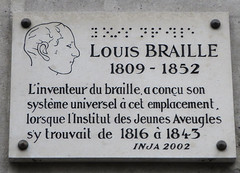Louis Braille
Commemorated on 1 plaque
Louis Braille 1809-1852 L'inventeur du braille, a conçu son système universel à cet emplacement, lorsque l'Institut des Jeunes Aveugles s'y trouvait de 1816 à 1843
English translation: Louis Braille 1809-1852, the inventor of braille, designed its universal system whilst the Institute for the Young Blind was located here from 1816 to 1843
2 rue des Écoles, Paris, France where they designed braille


